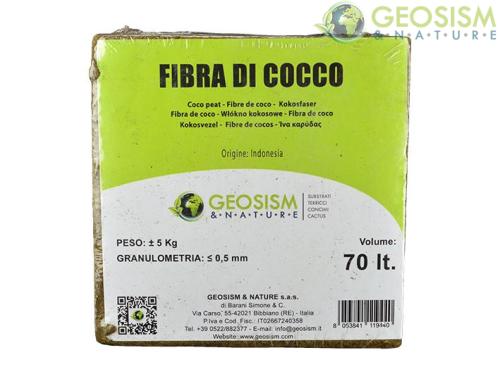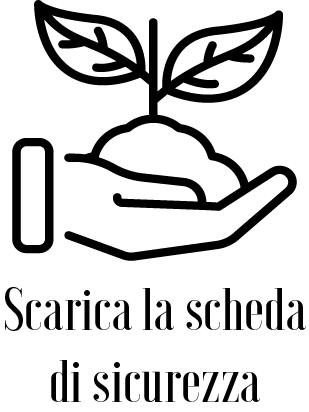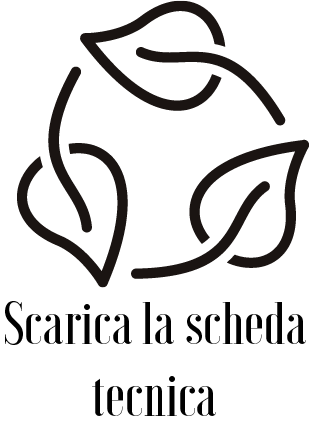Coconut fiber in Geosism tiles, <0.5 mm (approx. 5 kg - 70 lt)
COCONUT FIBER IN GEOSISM TILE, <0.5 mm (approx. 5 Kg -70 lt) .
Coconut fiber is a substrate obtained from coconut shells; it consists mainly of lignin and is composted outdoors for 2, 3 years. After the maturation phase, this material of organic origin is dehydrated and compressed. It is completely sanitized, i.e. free of infesting seeds of phytopathogens (mycetes, viruses and bacteria) and phytogens (nematodes and insects) in pre-compressed bricks of 30x30x12-15 cm made up of 100% pith.
The vast majority of the world's coir is produced, processed and exported from Bangladesh. Coconut fiber is one of the most practical and efficient substrates on which to grow: it is light, well ventilated and oxygenated, has excellent drainage, stable pH, retains humidity, is ecological and recyclable. It has no nutritional values, so it is essential to irrigate from the beginning with specific fertilizers for coconut or soil. Before its use, coconut fiber is extremely light and takes up little space; it is subsequently hydrated, acquiring a volume 4-6 times greater than the compressed one with undoubted advantages in its handling and transport. It has characteristics similar to blonde peats but more durable than the latter.
It ensures high drainage, a notable water retention capacity and undergoes degradation phenomena very slowly. Coconut fiber is naturally rich in stimulating hormones that help protect plants against disease and fungal infestations. One of the reasons it is so effective is that its purpose in nature is to provide the coconut with rich root nutrition once it falls from the tree itself. Furthermore, it is absolutely ecological both for the origins of the product and for its subsequent disposal.
Simple non-composted vegetable soil improver, neutral peat.
ALLOWED IN ORGANIC FARMING
MEDIA CHEMICAL ANALYSIS
Humidity: 16%;
Total nitrogen (N): 0.45%;
Nitrogen (N) ammoniacal: 0.1%;
Organic nitrogen (N): 0.35%;
Total organic carbon (C) TOC: 26.5%.
The determinations were carried out according to the official analysis methods for fertilizers (DM 03-24-1986 and subsequent amendments and additions).
TECHNICAL FEATURES
pH (in H2O): 8;
Electrical conductivity : 0.55 dS/m;
Dry bulk density: 320 kg/m3;
Total porosity : 88% volume;
Commercial volume (pressed): 20 litres;
Commercial volume (expanded): 70 litres.
FUNCTIONAL CHARACTERISTICS AND FIELDS OF USE
Ideal substrate for:
? cultivation of orchids;
? cultivation of any type of fruit or vegetable plant and soilless ornamental nursery plants; by inserting the plants inside containers and fertilizing the substrate, a more effective and faster production is obtained thanks to better aeration, oxygenation, water retention and excellent cation exchange of the substrate;
? for hydroponic cultures in general;
? as bedding for animals.
NB: INFORMATION ON VOLUME AND WEIGHT
The tiles weigh approximately 5 kg each, the weight is only an indicative data because it depends on various factors: humidity, percentage of fibre, percentage of husk, etc...
Each single tile develops a volume of approximately 70 liters once it is manually defibrated or, better yet, when it is wetted and swells.














